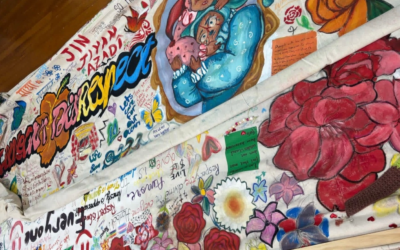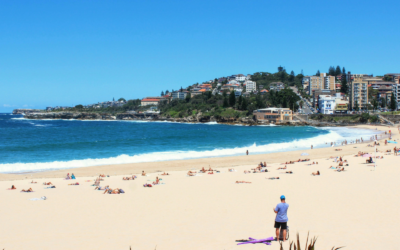On September 9th, ‘Festival of Action’ – a coalition of Western Sydney University students, staff and partners focus on climate and social justice, hosted the ‘Climate Justice through Reuse and Repair’, panel with advocacy group, ‘Parents for Climate’.
Blue Mountains City Council Program Leader of Sustainability in Waste Rob Morrison and Dr Jenna Condie, an academic and social researcher at Western, presented the Thought Leadership panel at Western’s Parramatta City Campus.
Online environmental activist organisation, the Sustainability Directory, defines reuse practices as ‘utilising a product multiple times for its original purpose or a new one, deferring its disposal.’ Thought Leadership panellists identified reuse practices such as reusable nappies and community resource swaps.
‘Climate justice underpins spaces that exchange clothes, books, toys, gadgets and furniture,’ said Condie on a recent clothing and resource swap event.
CEO of Parents for Climate Nic Seton says resource swaps are a versatile and sustainable way to reinvigorate climate action: ‘It [swaps] can scale up, it can happen everywhere for everyone, and it can address waste, social and economic inequalities, and rebuild community,’
The Sustainability Organisation further defines repair practices as restoring a damaged or malfunctioning item to a functional state, through mending or component replacement. The panellists identified repair practices such as creating sustainable community repair networks and undertaking electronics recovery.
‘Having communities that know where to go to get something fixed, how to offer their skills and participate in local economy is so important,’ said Seton on an ideal community repair system.
In the pursuit of climate justice, the panellists called for reuse and repair practices to be integrated at a community level. ‘We’re trying to provide resources to support community reuse and repair initiatives,’ said Morrison.
Some attendees supported community reuse and repair initiatives, recognising the environmental and social benefits. ‘People in communities should be giving items away to be reused because it’s better for the environment,’ said attendee and Western communications student Gerald-Lachlan Abadines. ‘Learning how to repair items from others in the community allows me to do it myself in the future, which doesn’t cost as much,’ said Macquarie University graduate and panel attendee Asmita Gautam. Gautam expressed some sanitary concerns about the practices, questioning approaches to furniture with ticks and lice, as well as exchanging intimate clothing items such as swimwear. Gautam added: ‘It might not be safe to repair everything yourself, such as electronics, it would be better to take it to a professional.’
The panellists indicated they don’t intend to slow down, believing sustainable practices can win the climate change battle. ‘I hope to see more of such events that reach international students as well as the general public to raise awareness about climate justice,’ said Gautam.



